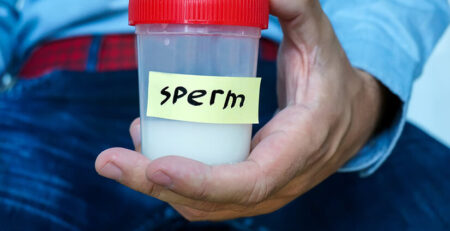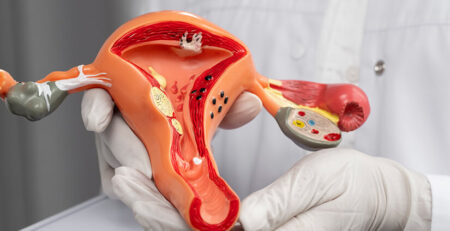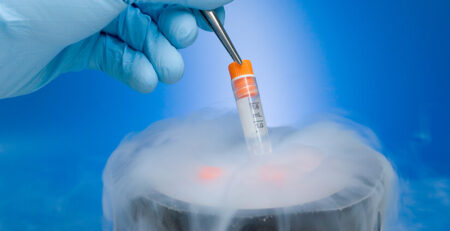What’s The Difference Between IUI And IVF?
Before making a decision on the the right fertility treatment, it is important to understand the options and how they work for specific infertility issues.
Two popular choices for infertility are IUI, a.k.a. Intra Uterine Insemination treatment and IVF, a.k.a. In Vitro Fertilisation treatment. Couples often struggle to choose which is right for them: IVF or IUI treatment. Therefore, understanding the difference between these procedures is important.
Let us take a deep dive into the details, the differences, similarities and the working methodologies of the two.
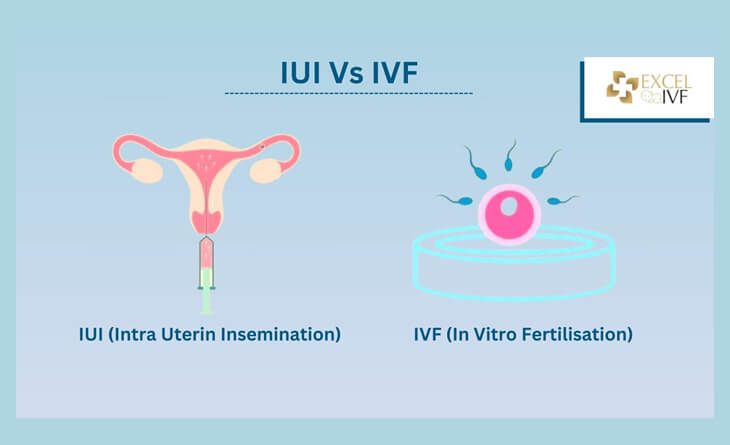
In Vitro Fertilization (IVF)
Let’s get started with in vitro fertilization procedure.
Introduction: IVF is a complex, invasive yet the most successful procedure to achieve pregnancy.
Procedure: The procedure of IVF involves the following steps:
Step 1: The procedure starts with ovary stimulation. Normally, your ovaries produce only one follicle each month. However, in IVF treatment, your doctor will give hormonal injections for 10-12 days daily to stimulate your ovary to produce more eggs. During this time, ultrasound and blood tests are also performed to check the progress of follicles.
Step 2: Egg Retrieval: On the day of egg retrieval, your doctor will put you under anesthesia so that you won’t feel any pain or discomfort. After putting you at ease, your doctor will insert a small needle attached to an ultrasound probe to collect eggs. These eggs are sent to the lab, where the embryologist scans them and places them in a dish.
Step 3: On the same day, your doctor will ask your partner to collect the semen sample. After that, the semen sample is prepared, and the motile sperms are selected. These sperm can be placed with eggs for fertilization or injected in egg by process called Intra Cytoplasmic Sperm Injection and then kept in the incubator.
Step 4: After 5 days, the embryos develop into blastocysts. The embryologist assesses these embryos under a microscope and selects 1-2 good embryos for implantation. That’s what kickstarts your pregnancy process.
Step 5: The final step of the IVF treatment is an embryo transfer. During the procedure, your doctor will use a long, thin tube to place the embryo into your womb. The whole process takes 15 to 30 minutes. After embryo transfer, you will monitored for at least 30 minutes before leaving the clinic.
After 10-14 days after the embryo transfer, your doctor will perform a pregnancy test, and if it is positive, you have all the reasons to smile!
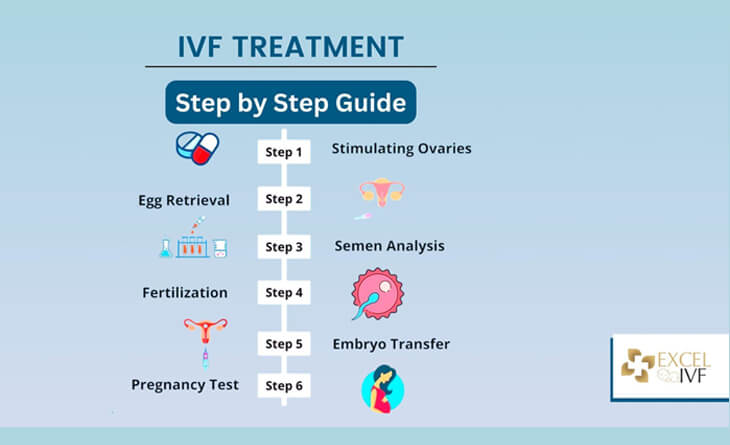
Precautions After Embryo Transfer: IVF is an invasive procedure; therefore, you need to follow your doctor’s instructions to increase the chances of your pregnancy. These instructions may include:
- You should take proper rest. At least 8 hours of sleep at night and two hours of sleep in the daytime is a must. You should also avoid strenuous activities.
- Take a well-balanced diet that includes healthy carbs and all essential nutrients. Avoid taking processed food.
- Stay hydrated and take all the prescribed medications.
- Follow a healthy lifestyle that includes maintaining stress and avoiding alcohol and smoking.
- Avoid sexual intercourse for ten days after embryo transfer.
- Don’t take pregnancy tests immediately.
Success Rate: IVF treatment is a controlled procedure where each step is performed under a controlled environmental condition. So, IVF’s success rate is higher, around 55-60%. However, this success rate depends on factors like parental age, causes of infertility, quality of egg and sperm.
IVF is a Good Option For: IVF can be used to treat a wide range of infertility conditions, including:
- Blocked or damaged fallopian tubes
- Male infertility, such as low sperm count or motility or surgically retrieved sperms from testis.
- Endometriosis
- Unexplained infertility
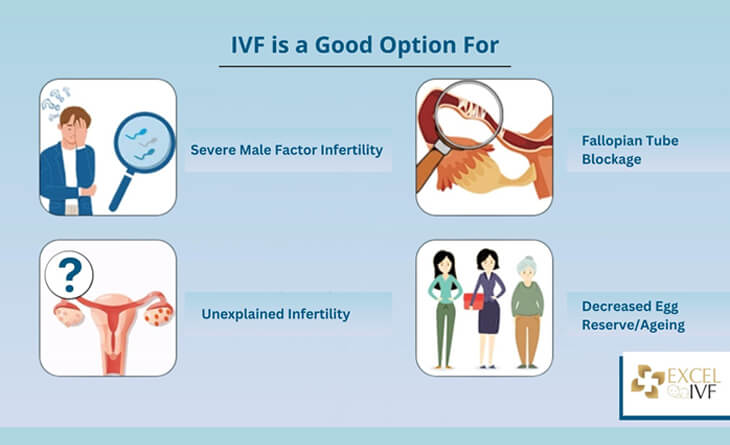
IVF can also be a good option for:
- Older patients or patients with low ovarian reserve.
- Who tried other fertility treatments like IUI without success.
- Couples who have a genetic disorder that they want to avoid passing on to their children.
Risks of IVF: Although it is safe and effective, like any other medical procedure, IVF also carries some side effects, including:
- Ovarian hyperstimulation syndrome (OHSS)
- Multiple pregnancies
- Infection
- Ectopic pregnancy
However, choosing the best IVF specialist in Delhi can help eliminate these risks and increase the procedure’s success rate. Afterall, it is one of the most important phases of life for you, right? Choose the best and leave the rest to your doctor.
Cost of the Procedure: IVF is a complicated multi-step process, so it is usually expensive. The average cost is between 1,25,000 INR and 2,50,000 INR. However, this cost depends on several factors, such as consultation fees, fertility medications, ultrasound or other blood tests, specific techniques, the number of cycles required, freezing surplus eggs and embryos, medical history, and clinic location.
Intrauterine Insemination (IUI)
Now, let’s move to the next part: intrauterine insemination procedure.
Introduction: IUI treatment is a simple and less invasive procedure that involves placing sperms directly into the uterus during ovulation. The best thing about this procedure is that it reduces sperms travel time and increases the chances of fertilization.
Procedure:
At the start of the procedure, your doctor will give you a hormonal injection or fertility medication to stimulate your ovary to produce one or two eggs. Your doctor will perform follicle monitoring to determine the right time for the IUI procedure. The IUI is done on the day of ovulation.
On the day of the procedure, your doctor will ask your partner to give a semen sample. After collecting the semen sample, the andrologist will wash it and separate the healthy and motile sperms in a small amount of medium. Now, your doctor will use a catheter (thin tube) to place this washed semen sample into the uterus.
Once the sperm sample is ready, the IUI treatment only takes a few minutes. The best part about the procedure is that it is minimally invasive and less costly.
Success Rate: The success rate of IUI treatment is usually less than IVF. The success rate of IUI is around 15 to 20%. This success rate depends on several factors, such as age, overall health, and the underlying cause of infertility. Among these factors, your age plays a significant role. As you get older, the chances of getting pregnant after an IUI procedure decrease. For example, if you are under 35, the success rate is 13%. But if you are over 40, the success rate reduces to 3-9%. For successful outcome in IUI treatment all the steps of IUI treatment which are stimulation, ultrasound monitoring, semen preparation, and insemination happen under one roof.
Precautions After IUI Procedure: You need to follow precautions after the procedure to increase the success of the treatment:
- Avoid strenuous activity, such as exercise, heavy lifting.
- Eat a healthy diet rich in fruits, vegetables, and whole grains. Avoid processed foods, sugary drinks, and caffeine.
- Manage your stress by incorporating light exercises and yoga into your daily routine.
- Avoid smoking and alcohol consumption.
IUI is a Good Option for: IUI is recommended in the following conditions:
- Mild male factor infertility, such as low sperm count or low sperm motility
- Unexplained infertility
- Female factor infertility like cervical mucus problems or endometriosis
- Couples who want to use donor sperm
- Problem with ovulation
- Ejaculation dysfunction
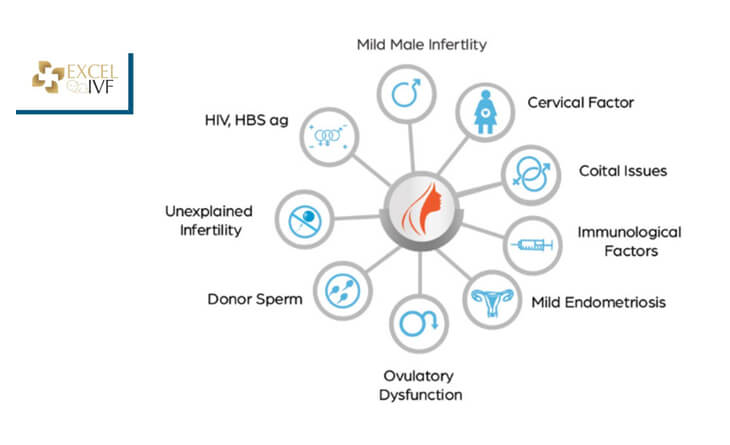
Risks of IUI: If you are considering IUI treatment, then you must be aware of the risks of the procedure. As IUI is a less invasive procedure, therefore there are fewer risks associated with it. The following are the common risks:
- Fertility medication used during the procedure can cause Ovarian Hyperstimulation Syndrome (OHSS).
- Some women experience mood swings, depression, hot flashes, headaches, nausea, or bloating, but these are manageable.
- Some women may experience cramping or spotting after insemination.
- Although rare, infections can also occur.
If you choose the best IVF centre for the procedure and follow your doctor’s instructions before, during, and after the treatment carefully, you can eliminate these side effects with ease, and you definitely want that.
Cost of the Procedure: If we are discussing the cost of the procedure, IUI is less expensive. The average cost of IUI can range from ₹15,000 to ₹25,000 for a single cycle of IUI, depending on the type of egg-forming injections used, the number of ultrasounds, and the number of consultations for follicle monitoring.
Which Procedure is Right for You: IUI or IVF
The best way to determine the right procedure is to consult the best IVF specialist in Delhi, who will assess your situation and recommend the treatment. Your doctor will decide the treatment procedure based on your age, your overall health and causes of infertility.
If you are a younger woman and have mild female factor infertility or your partner has low sperm count or sperm motility, your doctor will recommend an IUI procedure because your chances of getting pregnant are higher in these cases.
However, if you are older, have unexplained infertility, or your partner is dealing with severe male-factor infertility issues, then your doctor may recommend an IVF procedure.
If you are looking for fertility treatment but are confused between IVF or IUI treatment, book your consultation with Dr Rhythm Gupta. With her ample experience and expertise in conducting infertility treatments, she will explain the procedure in detail and recommend the best according to your situation.


